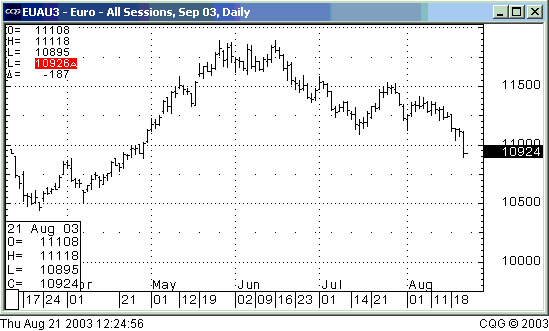I find this chart oddly compelling.

Some Chicago Boyz know each other from student days at the University of Chicago. Others are Chicago boys in spirit. The blog name is also intended as a good-humored gesture of admiration for distinguished Chicago School economists and fellow travelers.
I find this chart oddly compelling.

Comments are closed.
OK
What is it?
Sorry, guess I didn’t make it clear. It’s a chart showing the value of the Euro against the U.S. dollar. Notice that the Euro is getting drilled, blasted, toasted, whacked, smoked, pounded, and generally depreciated. Can’t say I mind.
The Euro was launched at $1.08? Is that right? So, the Euro has essentially gone nowhere in its short life.
The Euro might as well have been pegged to the dollar. Won’t that thought send Europeans into a low hover.
mmmmmmmmmm….breakdown below resistance….I love the smell of successful shorts in the morning.
We are some who voted no to the “WOODEN MONEY” here in Europe. And escaped it! (Danish Kroner)
Try and update your graph when the eastern countries join in some years, Jonathan. You have seen NOTHING yet.
I believe the earliest quote is from December 15, 1998 at $1.18 Euro/$. Since then it has fluctuated.
What will be interesting to see when the eastern countries join the Euro is their political reaction to the new unemployment rates. The interesting thing to see with the Euro will be the practical end of the stagnation and insecurity pact when the irresponsible French and Germans fail to show the requisite fiscal discipline, despite the example of the Italians and Greeks.
Hmmm… looking at the curve I would say that some people thought that Gulf War II in Iraq would hurt the Americans badly. In June they had to change their minds.
i think something is being missed. look at that great arc up, peaking in may and june. that didn’t happen by accident. the us crashed the dollar deliberately. why? a low dollar hurts europe more than the us. eurpean exports to the us are seriously hurt. and this means that although the us economy has turned the corner, europe isn’t riding the us recovery the way it normally would happen. so why? the us was doing with europe economically what it had done with iraq militarily.
Liz,
The thought has occurred to me, though I think it’s more likely that the slow economy, low interest rates, and perhaps political sensitivity to the wishes of big-business exporters were behind the Administration’s dalliance with a weaker (though not historically weak) USD. But whatever their intent, I doubt that U.S. officials minded that they were effectively punishing Europeans.
Specially when the punishment is mostly a function of labor market and other structural economic rigidities. Germany asked for the ‘Stability and Growth Pact’ that demands they raise taxes in the middle of a recession.
Most of those countries have been punishing themselves and a weak dollar is only shining a bright light on their folly.